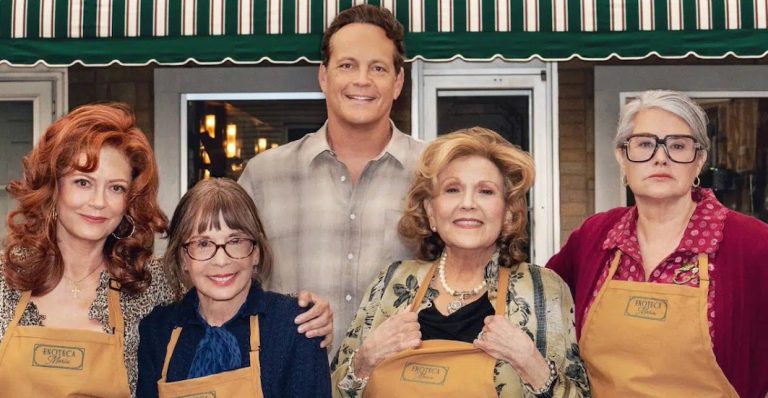
Popular streaming series delivers predictable charm while sidestepping complex Italian American political realities
New York, N.Y. – Netflix‘s latest romantic comedy Nonnas presents viewers with a familiar recipe: charming Italian American families, predictable love stories, and enough nostalgia to fill a Sunday dinner table.
Yet beneath its saccharine surface lies a curious omission that speaks to the complexities of modern storytelling in an increasingly polarized cultural landscape.
The series follows traditional romantic comedy beats with precision, delivering the expected emotional payoffs while wrapping itself in the warm embrace of Italian American culture. Viewers are treated to scenes of bustling kitchens, multi-generational family gatherings, and the kind of authentic cultural details that make the show both comforting and engaging.
Strong Performances Anchor Familiar Territory
The cast delivers performances that elevate the material beyond its predictable framework. Susan Sarandon brings gravitas to her role, while the supporting ensemble creates believable family dynamics that resonate with authenticity. The portrayal of the nursery nun character stands out as particularly engaging, offering moments of genuine humor and heart that anchor the movie’s more conventional romantic elements.
The Italian grandmothers featured throughout the film provide some of the show’s most entertaining moments, embodying the cultural stereotypes viewers expect while occasionally transcending them through nuanced performances. Their presence serves as both comic relief and cultural touchstone, grounding the film in recognizable traditions. Brenda Vaccaro as Antonella, Lorraine Bracco as Roberta, and Talia Shire as Teresa ground the film in tradition and humor.
Cultural Representation Meets Political Avoidance
However, Nonnas reveals a significant blind spot in its cultural portrayal. While the series embraces the warmth and tradition associated with Italian American families, it carefully avoids engaging with the conservative political legacy that characterizes many Italian American communities, particularly in areas like Brooklyn and Staten Island.
This omission becomes particularly notable given the show’s New York setting and its apparent commitment to authentic cultural representation. And given Susan Sarandon‘s role in the film.
The conservative values and political alignments that have historically
defined many Italian American neighborhoods receive no acknowledgment,
creating a sanitized version of these communities that feels incomplete.
The Challenge of Contemporary Storytelling
The film’s reluctance to address political complexity reflects broader challenges facing contemporary entertainment. In an era where audiences increasingly seek authentic representation, creators must navigate the tension between cultural accuracy and commercial appeal. Nonnas chooses the safer path, presenting Italian American culture through a lens that emphasizes universal themes of family and tradition while avoiding potentially divisive political realities.
This approach raises questions about the responsibility of cultural representation in popular media. When shows claim to authentically portray specific communities, do they have an obligation to address the full spectrum of that community’s values and beliefs, even when those beliefs might be controversial or unpopular with certain audiences?
Missing the Full Picture
The show’s liberal-leaning characters exist in a vacuum that doesn’t acknowledge the political diversity within Italian American communities. This creates a portrayal that, while pleasant and accessible, fails to capture the genuine complexity of these neighborhoods and families.
The conservative legacy evident in places like Staten Island and parts of Brooklyn represents a significant aspect of Italian American identity that has shaped generations of families. By ignoring this reality, Nonnas presents a version of Italian American life that may feel authentic in its surface details but lacks the political and cultural tensions that define contemporary community dynamics.
The film succeeds in delivering the comfort food equivalent of romantic comedy entertainment. Viewers seeking familiar relationship dynamics, cultural warmth, and predictable emotional satisfaction will find plenty to enjoy. The production values are solid, the performances engaging, and the cultural details sufficiently authentic to create an immersive viewing experience.
Yet for those seeking deeper cultural exploration or more complex character development, Nonnas may feel frustratingly surface-level. The show’s unwillingness to engage with challenging aspects of Italian American identity limits its potential for meaningful cultural commentary.
Netflix’s Nonnas Offers Sweet Romance Without the Politics (July 2, 2025)
Audio Summary (75 words)
Netflix’s “Nonnas” delivers predictable romantic comedy entertainment with strong performances from Susan Sarandon and an engaging supporting cast. While the series successfully captures Italian American cultural warmth through family traditions and authentic details, it notably avoids addressing the conservative political legacy prevalent in communities like Brooklyn and Staten Island. This omission creates sanitized cultural representation that prioritizes commercial appeal over complete authenticity, raising questions about contemporary entertainment’s responsibility in portraying complex community dynamics.